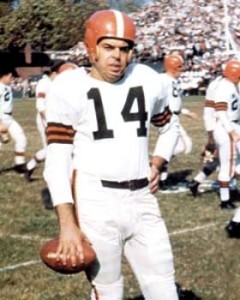Automatic Otto Graham
As we begin another football season, we recognize as the September Sports Then and Now Athlete of the Month an all-time great whose first sport wasn’t football, but after he found his calling excelled both as a collegiate player and as one of the greatest winners in pro football history.
Otto Graham didn’t actually come to Northwestern University to play football. He originally came to Northwestern on a basketball scholarship. It was only after Northwestern football coach Pappy Waldorf saw Graham playing freshman intramural football that he was invited to tryout for the football team.
Graham ended up playing three seasons for Northwestern and broke every existing Big Ten passing record during his career. He was a two-time All-America selection and won the Big Ten MVP Award.
Northwestern went 5-3 in 1941 and in 1942 Graham actually played on a losing team for the last time in his football career as the Wildcats posted a 1-9 record.
During his senior season, Northwestern went 6-2 and was ranked in the top 10. Their only two losses were to then-ninth ranked Michigan and then-top ranked Notre Dame. Graham finished third in the 1943 Heisman Trophy balloting.
While at Northwestern, Graham earned eight varsity letters in football, basketball and baseball. He is one of only two Northwestern athletes to earn All-America honors in two sports (basketball and football).
He was selected with the fourth pick in the 1944 NFL Draft by the Detroit Lions, but instead became a commissioned officer in the United States Navy Air Corp and served for two years.
Following the end of the war, he joined the Cleveland Browns of the fledgling All-American Football Conference for the 1946 season.
However, even before playing professional football, he spent one season playing professional basketball for the Rochester Royals of the National Basketball League and helped lead the Royals to the championship.
Playing on championship teams soon became standard practice for Graham.
The Browns claimed the AAFC championship in each of the four-year existence of the league. Graham was named league MVP in 1947 and co-MVP in 1948.
In 1950 the Browns joined the National Football League, but the winning ways continued. The Browns won the NFL Championship in 1950 as Graham drove them down the field toward a winning field goal in the final minutes.
After losing in the championship game each of the next three seasons, the Browns won the league title in both 1954 and 1955.
A seven-time first team All-Pro during his career, Graham was named the UPI NFL MVP in 1951, 1953 and 1955.
He retired following the 1955 season and was inducted into the Pro Football Hall of Fame in 1965. He had previously been selected to the College Football Hall of Fame in 1956.
In his 10 professional seasons, “Automatic Otto” led the Browns to a 105-17-4 record (.810 winning percentage).
Graham was named as Northwestern’s greatest football player during the Big Ten’s 75th anniversary year and was also named to the NFL’s 75th Anniversary Team.
Following his retirement, Graham spent seven seasons as head football coach at the Coast Guard Academy and led them to an undefeated regular season in 1963.
In 1966 he became head coach of the Washington Redskins and in three seasons guided the squad to a 17-22-3 record.
After his brief stint as an NFL coach, he returned to the Coast Guard Academy as Athletic Director and served in that role until retiring in 1984.
Graham passed away in December 2003.

The importance of education is great because it teaches how to communicate at different occasions. The ability to speak well is one thing and the capability to deliver the right word at right time is learned from education.